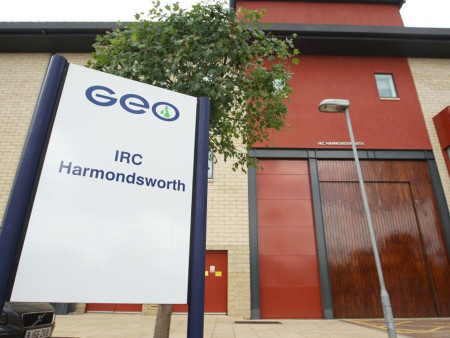Daily attempts amongst immigration detainees

An unprecedented number of inmates in Britain’s notorious immigration removal centres (IRCs) have attempted to end their own lives, according to official figures.
A freedom of information request reveals that 393 detainees – or more than one per day, on average – attempted suicide over the course of 2015. This figure represents an 11 percent increase on official Home Office figures for 2014. There was also a 7 percent rise in the number of people detained – up to 32,466.
Harmondsworth IRC, which is in West Drayton, close to London Heathrow airport, reported the greatest number of suicide attempts at 105, or an astonishing average of two every week. The infamous Yarl’s Wood IRC in Bedfordshire, which mainly holds female detainees, reported 64 attempts. The Verne IRC in Dorset and Morton Hall IRC in Lincolnshire came next with 52 and 51, respectively. In all, 2,597 detainees were on suicide watch during 2015, of which 11 were children detained in Sussex’s fancifully named Cedars ‘Pre-Departure Accommodation’ facility near Gatwick, the first removal centre designated for families with children.
The Home Office is under pressure to reduce the number of people held in IRCs, especially the vulnerable and sick, those without a criminal history and those not considered a threat or flight risk. In March this year, the House of Lords voted by 187 to 170 that detention in immigration removal centres must be limited to 28 days unless a court rules otherwise. Scores of detainees have been held far longer.
In March 2015, detainees at Harmondsworth mounted a protracted hunger strike, complaining of unfair treatment. Upwards of 240 inmates refused food alleging multiple incidents of maltreatment in a protest that soon spread to other IRCs.
Harmondsworth IRC, which is run by GEO Group UK, should give cause for particular concern. The Hillingdon facility ranked an enviable seventh place of the eleven centres then operating for incidents of self-harm in 2010 with a total of five cases, yet since 2014 has topped the list, which now comprises 14 facilities, with 68 reported incidents
It should be stressed that IRC detainees need not have done anything wrong. Around half of the women in Yarl’s Wood, for example, are guilty only of claiming asylum and many are held captive because they are still waiting for decisions and/or appeals to be heard. Ostensibly a ‘removal centre’ – the clue is in the name – an IRC is meant to be a last staging post before abeyant deportees are put on a plane. Yet, in the case of Yarl’s Wood, it turns out that three-quarters of detainees are eventually released according to a report conducted last year by the outgoing Chief Inspector of Prisons, Nick Hardwick.
A report was published in January examining the welfare of detainees. Author Stephen Shaw, former prisons ombudsman, called for a reduction in the number of people placed in detention and said pregnant women should not be admitted at all. Commenting on the figures released on Monday, Shaw told the Guardian newspaper:
“Levels of self-harm are critical indicators of the health of any institution and the welfare of those in detention. Many detainees are extremely vulnerable and experience high levels of anxiety and depression. If implemented, the proposals I have made to the government would improve welfare, reduce vulnerability, and ensure a more effective use of the detention estate.”
A spokeswoman for the charity Medical Justice, which works to improve the health of immigration detainees, said care provided in the centres is “not adequate” to deal with mental health issues.
“We find that many detainees have serious mental health issues, having suffered torture in the home countries and then faced with the trauma of indeterminate detention. The increasing numbers of detainees who self-harm or attempt suicide is very concerning and the health care provided in immigration removal centres is not adequate to deal with the levels of mental distress,” she said.








